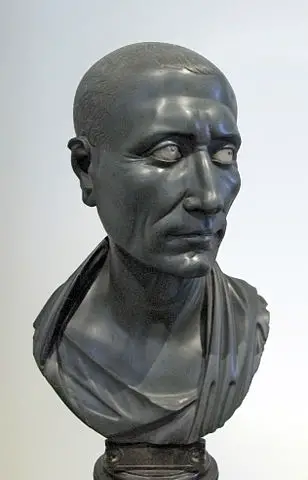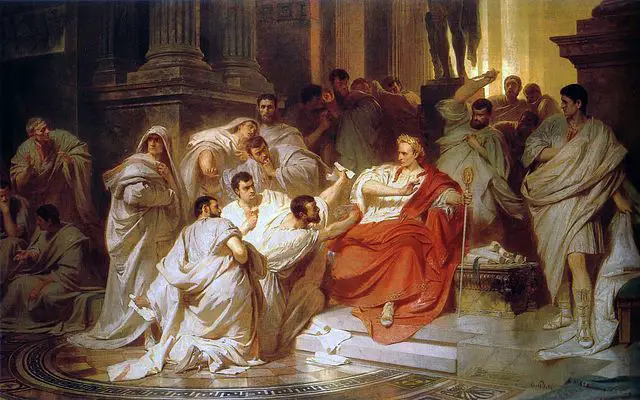Gaius Julius Caesar was born in Rome to an aristocratic family in July 12 or 13, 100 BC.
He married at least three times and had two daughters and many mistresses including Cleopatra, the Queen of Egypt, who gave him one son named Caesarion.

Early Life
While Julius was growing up, the Roman Republic was in shambles. The nobility was being challenged. When he married, Sulla, a dictator, ordered him to divorce his wife. Julius refused and joined the army and left Rome to serve in Roman provinces in Asia and then Cilicia, a place we know as Turkey.
During his travels to Rhodes, a Greek island, he was captured by pirates who demanded a ransom.
Somehow, through trickery and counter-espionage, Julius Caesar was able to escape and organised a naval force to attack and capture the pirates who were captured and executed. It was hailed as a great victory.
To add to his reputation, he led many campaigns against other rulers who waged war on Rome and greatly expanded the Roman Empire.
Serving in Roman Government
With Pompey’s help, Julius Caesar was elected consul in 59 BC. This was the most powerful position in Rome’s government.
He began working with Pompey, a former opponent, and served in several government positions including governor of the Roman province in Spain and governor of Gaul (which is France and Belgium today).
He expanded his military and conquered more lands making him one of the greatest military leaders of Rome. Even though he was away from Rome, he hired agents to conduct business on his behalf.
Pompey and Marcus Crassus were rivals, but Julius Caesar proved his skill of negotiation. The three men formed the First Triumvirate – Julius Caesar, Marcus Crassus, and Pompey.
Turning Against Pompey
Pompey was very jealous of Julius Caesar even though they were partners in the First Triumvirate. At the same time, Crassus, the other partner, did not truly trust Pompey.
Crassus was killed in battle in Syria 3 years later. In 49 BC, Caesar led his troops across the Rubicon, a river in northeast Italy.
This was the beginning of the Roman Civil War. Caesar pushed Pompey and his troops out of Italy and into Egypt where Pompey was killed.
When Caesar returned to Rome, he was named the Father of his Country and became dictator for life.
Accomplishments
Julius Caesar expanded the Roman Empire and expanded the military and the navy. He rebuilt Corinth and Carthage, two city states that previous leaders had destroyed.
He gave some foreigners Roman citizenship. He invited defeated enemies to join his government.
He increased the size of the Senate to better represent all Romans. He introduced the Roman calendar of 365 days and one leap year, which we use today.

Assassination
There were still those who envied Caesar and thought he had too much control within the Roman Senate and thought he acted like a king.
Two Senate members, Gaius Cassius Longinus and Marcus Junius Brutus led a group of disgruntled Senators.
They called themselves liberators. One year after Caesar had been named ruler for life, the liberators surrounded Caesar and stabbed him to death. This happened on March 14, 44 BC, the Ides of March.

Questions:
- When Julius Caesar began his military career, where did he go?
- Who helped Julius Caesar win the election and named as consul?
- Who made up the First Triumvirate?
- What did Caesar and his troops do when they crossed the Rubicon River?
- How was Caesar assassinated?

Answers:
- Julius Caesar began his military career in campaigns in Asia and Cilicia (Turkey).
- Pompey helped Julius Caesar be elected as consul?
- The First Triumvirate was Julius Caesar, Marcus Crassus, and Pompey.
- Caesar and his troops crossed the Rubicon River and chased Pompey and his troops out of Italy and into Egypt.
- Two Senators, Longinus and Brutus led a group of disgruntled Senators plotted together and surrounded Caesar and stabbed him to death on March 15, 44 BC which is called the Ides of March.